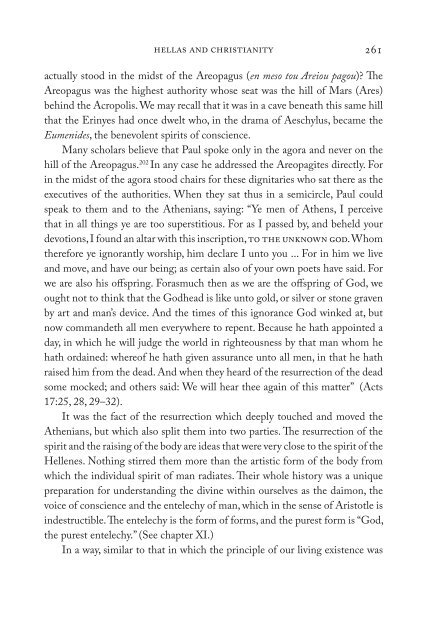The Gospel of Hellas - Research Institute for Waldorf Education
The Gospel of Hellas - Research Institute for Waldorf Education
The Gospel of Hellas - Research Institute for Waldorf Education
Create successful ePaper yourself
Turn your PDF publications into a flip-book with our unique Google optimized e-Paper software.
hellas and christianity<br />
actually stood in the midst <strong>of</strong> the Areopagus (en meso tou Areiou pagou)? <strong>The</strong><br />
Areopagus was the highest authority whose seat was the hill <strong>of</strong> Mars (Ares)<br />
behind the Acropolis. We may recall that it was in a cave beneath this same hill<br />
that the Erinyes had once dwelt who, in the drama <strong>of</strong> Aeschylus, became the<br />
Eumenides, the benevolent spirits <strong>of</strong> conscience.<br />
Many scholars believe that Paul spoke only in the agora and never on the<br />
hill <strong>of</strong> the Areopagus. 202 In any case he addressed the Areopagites directly. For<br />
in the midst <strong>of</strong> the agora stood chairs <strong>for</strong> these dignitaries who sat there as the<br />
executives <strong>of</strong> the authorities. When they sat thus in a semicircle, Paul could<br />
speak to them and to the Athenians, saying: “Ye men <strong>of</strong> Athens, I perceive<br />
that in all things ye are too superstitious. For as I passed by, and beheld your<br />
devotions, I found an altar with this inscription, to the unknown god. Whom<br />
there<strong>for</strong>e ye ignorantly worship, him declare I unto you ... For in him we live<br />
and move, and have our being; as certain also <strong>of</strong> your own poets have said. For<br />
we are also his <strong>of</strong>fspring. Forasmuch then as we are the <strong>of</strong>fspring <strong>of</strong> God, we<br />
ought not to think that the Godhead is like unto gold, or silver or stone graven<br />
by art and man’s device. And the times <strong>of</strong> this ignorance God winked at, but<br />
now commandeth all men everywhere to repent. Because he hath appointed a<br />
day, in which he will judge the world in righteousness by that man whom he<br />
hath ordained: where<strong>of</strong> he hath given assurance unto all men, in that he hath<br />
raised him from the dead. And when they heard <strong>of</strong> the resurrection <strong>of</strong> the dead<br />
some mocked; and others said: We will hear thee again <strong>of</strong> this matter” (Acts<br />
17:25, 28, 29–32).<br />
It was the fact <strong>of</strong> the resurrection which deeply touched and moved the<br />
Athenians, but which also split them into two parties. <strong>The</strong> resurrection <strong>of</strong> the<br />
spirit and the raising <strong>of</strong> the body are ideas that were very close to the spirit <strong>of</strong> the<br />
Hellenes. Nothing stirred them more than the artistic <strong>for</strong>m <strong>of</strong> the body from<br />
which the individual spirit <strong>of</strong> man radiates. <strong>The</strong>ir whole history was a unique<br />
preparation <strong>for</strong> understanding the divine within ourselves as the daimon, the<br />
voice <strong>of</strong> conscience and the entelechy <strong>of</strong> man, which in the sense <strong>of</strong> Aristotle is<br />
indestructible. <strong>The</strong> entelechy is the <strong>for</strong>m <strong>of</strong> <strong>for</strong>ms, and the purest <strong>for</strong>m is “God,<br />
the purest entelechy.” (See chapter XI.)<br />
In a way, similar to that in which the principle <strong>of</strong> our living existence was

















